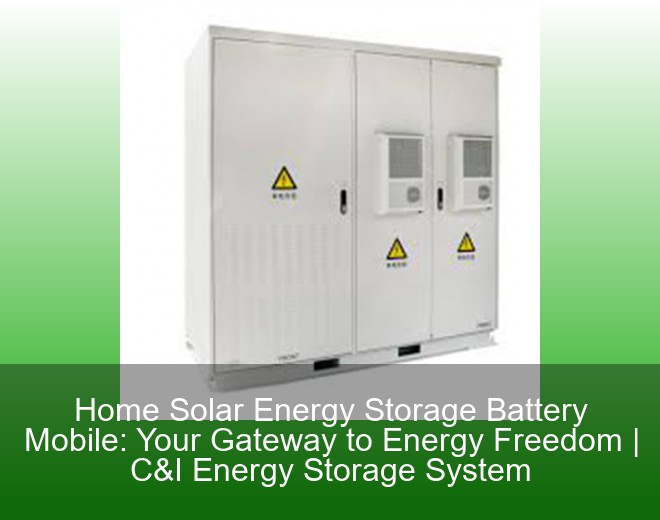
a single device that can store blood safely across diverse environments—whether in a bustling urban hospital or a mobile clinic in the Sahara. That’s the magic of a universal blood storage device. Unlike traditional refrigerated units limited to fixed locations, these devices combine temperature control, portability, and real-time monitoring to protect one of medicine’s most precious resources: blood. Think of it as a Swiss Army knife for blood banks, but way cooler (pun intended). [2025-08-10 14:55]

Ever wonder what goes into making those industrial-sized "power banks" for renewable energy? Let's peel back the steel curtain on energy storage container production. These modern marvels aren't your grandma's Tupperware – we're talking about sophisticated systems that make NASA's coffee machines look simple. [2025-08-06 19:06]

It's 8 PM, your solar panels have clocked out for the day, and your Netflix binge suddenly turns into a real-life blackout drama. Enter home solar energy storage batteries – the unsung heroes that keep your lights on when the sun takes a coffee break. These mobile power banks for your house are rewriting the rules of energy independence, one charged electron at a time. [2025-08-04 16:08]

Let’s face it – Haiti’s energy landscape has more twists than a Caribbean hurricane season. With 60% of rural populations lacking reliable electricity access and diesel generators guzzling funds like tourists downing coconut water, the proposed Haiti pumped storage project could be the island’s energy lifeline. Think of it as a giant water battery that stores sunshine and wind for rainy days (literally). [2025-08-02 11:31]

Ever wondered why some energy storage systems outlive their warranties while others conk out faster than a cheap flashlight? The service life of power storage containers isn't just about technical specs – it's your ticket to maximizing ROI in renewable energy systems. Let's cut through the jargon and explore what really makes these modern "energy piggy banks" tick. [2025-07-17 14:17]

Let's face it – designing an energy storage facility isn't like rearranging your living room furniture. An energy storage plant layout atlas serves as the ultimate cheat code for engineers, project managers, and even coffee-fueled robotics specialists trying to squeeze maximum efficiency from limited space. With renewable energy projects growing faster than bamboo in a rainforest (global energy storage capacity is projected to reach 1.3 TWh by 2030[1]), getting the layout right could mean the difference between a smooth operation and a "why is that transformer dancing?" situation. [2025-07-14 07:16]

Your solar panels work overtime at noon, but your Netflix binge happens at midnight. Enter energy storage – the ultimate wingman for renewable energy. This tech isn't just about saving sunshine in a box (though that's part of it). We're talking about an $74.5 billion global industry growing faster than a lithium-ion battery heats up when overcharged [3][4]. [2025-07-08 15:04]

Your $500,000 battery storage system gets ruined because someone skimped on 20 microns of paint. Suddenly, paint thickness becomes the most exciting topic at your Monday meeting. Whether you're an engineer, procurement manager, or facility operator, understanding paint thickness for energy storage containers is like knowing the secret sauce to equipment longevity. [2025-07-01 15:25]

If you're an engineer working on grid-scale batteries, a sustainability officer in heavy industries, or simply a tech enthusiast curious about energy storage substrate steel, this article is your golden ticket. With global renewable energy capacity projected to grow by 75% by 2030 (IEA), the demand for robust energy storage materials has never been higher. Let’s dive into why substrate steel isn’t just another metal—it’s the unsung hero keeping your lights on during blackouts. [2025-06-26 22:07]

Let's face it – energy storage systems are the unsung heroes of our transition to renewable energy. Whether you're a solar-powered homeowner, a wind farm operator, or just someone who hates power outages, understanding energy storage system capacity is like knowing how big your gas tank is before a road trip. But what exactly does "capacity" mean in this context? Simply put, it's the total amount of energy a system can store and deliver, measured in kilowatt-hours (kWh) or megawatt-hours (MWh) [3]. [2025-06-11 06:32]

Every time you hit a pothole or speed bump, your car is secretly harvesting energy like a squirrel storing nuts for winter. This isn't sci-fi – it's the cutting-edge world of car shock absorber energy storage systems. While most drivers only care about avoiding spine-jarring bumps, engineers are reimagining shock absorbers as dual-purpose heroes that smooth your ride and recapture wasted energy. [2025-06-06 21:32]

Imagine a giant, supercharged spinning top that stores electricity like a battery—that's flywheel energy storage in a nutshell. This 21st-century "mechanical battery" uses rotational kinetic energy to store electricity, offering 90% efficiency and 20+ year lifespans [1][8]. Unlike chemical batteries that degrade like overworked smartphones, flywheels keep spinning reliably—literally. [2025-06-03 21:06]
Enter your inquiry details, We will reply you in 24 hours.
Brand promise worry-free after-sales service